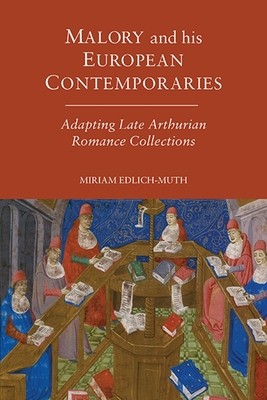
- We will send in 10–14 business days.
- Author: Miriam Edlich-Muth
- Publisher: Boydell & Brewer
- ISBN-10: 1843843676
- ISBN-13: 9781843843672
- Format: 15.6 x 23.4 x 1.3 cm, hardcover
- Language: English
- SAVE -10% with code: EXTRA
Reviews
Description
A reconsideration of Arthurian compilations in the late middle ages, looking at the complex ways in which they reshape their material for new audiences.
The late-medieval adaptions and compilations of the Arthurian story are a European phenomenon that has sparked both mystification and controversy. Often dismissed as nostalgic recreations that attempt to halt the literary tide, these ambitious projects saw adaptors from across Western Europe combining a vast array of prose and verse sources from different languages into encyclopedic narrative chronologies of King Arthur and his court. Ranging from ornate verse adaptations to heavily condensed prose works, the resulting texts reflect a process of translating, cutting and arranging Arthurian material into new literary incarnations, which nonetheless retain recognisable versions of the Arthurian story.This study re-evaluates Malory's Morte Darthur and four broadly contemporary European romance collections, including Jean Gonnot's French BN.fr.112 manuscript, Ulrich Fuetrer's German Buch der Abenteuer, the Dutch Lancelot Compilation, and the Italian Tavola Ritonda, in the context of this adaptive process. In doing so, it investigates how the adaptors respond to the shared structural and stylistic challenges of incorporating new material into the well-known story of King Arthur and comes to intriguing conclusions about the ways in which the narrative demands of late Arthurian adaptations invited authors to populate the Arthuriancourt with new and more complex protagonists. Miriam Edlich-Muth currently teaches Old and Middle English language and literature at the University of Cambridge.
EXTRA 10 % discount with code: EXTRA
The promotion ends in 19d.23:26:52
The discount code is valid when purchasing from 10 €. Discounts do not stack.
- Author: Miriam Edlich-Muth
- Publisher: Boydell & Brewer
- ISBN-10: 1843843676
- ISBN-13: 9781843843672
- Format: 15.6 x 23.4 x 1.3 cm, hardcover
- Language: English English
A reconsideration of Arthurian compilations in the late middle ages, looking at the complex ways in which they reshape their material for new audiences.
The late-medieval adaptions and compilations of the Arthurian story are a European phenomenon that has sparked both mystification and controversy. Often dismissed as nostalgic recreations that attempt to halt the literary tide, these ambitious projects saw adaptors from across Western Europe combining a vast array of prose and verse sources from different languages into encyclopedic narrative chronologies of King Arthur and his court. Ranging from ornate verse adaptations to heavily condensed prose works, the resulting texts reflect a process of translating, cutting and arranging Arthurian material into new literary incarnations, which nonetheless retain recognisable versions of the Arthurian story.This study re-evaluates Malory's Morte Darthur and four broadly contemporary European romance collections, including Jean Gonnot's French BN.fr.112 manuscript, Ulrich Fuetrer's German Buch der Abenteuer, the Dutch Lancelot Compilation, and the Italian Tavola Ritonda, in the context of this adaptive process. In doing so, it investigates how the adaptors respond to the shared structural and stylistic challenges of incorporating new material into the well-known story of King Arthur and comes to intriguing conclusions about the ways in which the narrative demands of late Arthurian adaptations invited authors to populate the Arthuriancourt with new and more complex protagonists. Miriam Edlich-Muth currently teaches Old and Middle English language and literature at the University of Cambridge.


Reviews